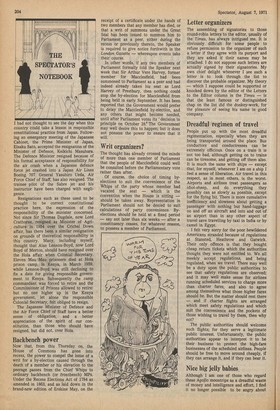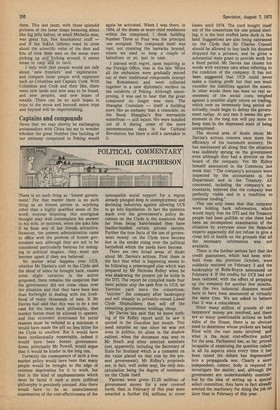THE SPECTATOR'S NOTEBOOK
I had not thought to see the day when this country could take a lesson in responsible constitutional practice from Japan. Following an emergency meeting of the Japanese Cabinet, the Prime Minister of Japan, Eisaku Sato, accepted the resignation of the Minister of Defence, Keikichi Masuhara. The Defence Minister resigned because of his formal acceptance of responsibility for the air crash when a Japanese defence force jet crashed into a Japan Air Lines Boeing 707. General Yasuhiro Ueda, Air Force Chief of Staff, has also resigned. The trainee pilot of the Sabre jet and his instructor have been charged with negligence.
Resignations such as these used to be thought to be correct constitutional practice here, the expression of the responsibility of the minister concerned. Not since Sir Thomas Dugdale, now Lord Crathorne, resigned as Minister of Agriculture in 1954 over the Crichel Down affair, has there been a similar resignation on grounds of theoretical responsibility in this country. Many, including myself, thought that Alan Lennox-Boyd, now Lord Boyd of Merton, should have resigned over the Hola affair when Colonial Secretary. Eleven Mau Mau prisoners died at Hola prison camp, in Kenya, in March 1959, while Lennox-Boyd was still declining to fix a date for giving responsible government to Kenya. Subsequently the camp commandant was forced to retire and the Commissioner of Prisons allowed to retire: but no one higher up in the Kenya government, let alone the responsible Colonial Secretary, felt obliged to resign.
The Japanese Minister of Defence and the Air Force Chief of Staff have a better sense of obligation, and a better appreciation of the spirit of our constitution, than those who should have resigned, but did not, over Hola.
Backbench power
Now that, from this Thursday on, the House of Commons has gone into recess, the power to compel the issue of a writ for a by-election caused through the death of a member or his elevation to the peerage passes from the Chief Whips to ordinary backbench (or frontbench) MPs. Under the Recess Elections Act of 1784 as amended in 1863, and as laid down in the brand-new edition of Erskine May, on the receipt of a certificate under the hands of two members that any member has died, or that a writ of summons under the Great Seal has been issued to summon him to Parliament as a peer, either during the recess or previously thereto, the Speaker is required to give notice forthwith in the London Gazette — whereupon events take their course.
In other words, if any two members of Parliament formally told the Speaker next week that Sir Arthur Vere Harvey, former member for Macclesfield, had been summoned to Parliament as a peer and had indeed already taken his seat as Lord Harvey of Prestbury, then nothing could stop the by-election for Macclesfield from being held in early September. It has been reported that the Government would prefer to delay the Macclesfield by-election, and any others that might become needed, until after Parliament votes its decision in principle on October 28./ The Government may well desire this to happen; but it does not possess the power to ensure that it will.
Writ organizers?
The thought has already crossed the minds of more than one member of Parliament that the people of Macclesfield could well be consulted before the Parliamentary vote rather than after.
Of course, the choice of timing byelections to suit the convenience of the Whips of the party whose member had vacated the seat — which is the convention when the House is sitting — should be taken away. Representation in Parliament should not be denied to suit calculations of party convenience. Byelections should be held at a fixed period — say not later than six weeks — after a constituency ceases, for whatever reason, to possess a member of Parliament.
Letter organizers
The assembling of signatories to those round-robin letters to the editor, usually of the Times, has always intrigued me. It is obviously difficult for some people to refuse permission to the organizer of such a letter if they agree with its purport and they are asked if their names may be attached. I do not suppose such letters are actually signed by their signatories. My own chief delight whenever I see such a letter is to look through the list to discover the probable organizer. My theory — which I suppose could be supported or knocked down by the editor of the Letters to the Editor column in the Times — is that the least famous or distinguished chap on the list did the donkey-work, for the pleasure of seeing his name in good company.
Dreadful regimen of travel
People put up with the most dreadful regimentation, especially when they are being transported around the place. Bus conductors and conductresses can be extremely officious. Once on a train it is not too bad, although getting on to trains can be tiresome, and getting off them also. It is much the same with ships — except that, for myself, whenever I am on a ship I feel a sense of liberation. Air travel in this respect, as in most others, is the worst. Airports and airlines treat passengers as idiot-sheep, and do everything they possibly can as slowly as possible, except for the flying bit. There is more cumulative inefficiency and slowness about getting a passenger with nothing but hand-luggage on and off an aircraft and into and out of an airport than in any other aspect of travel save travelling by taxi in India or by camel in Egypt.
I felt very sorry for the poor bewildered Americans stranded because of regulations at Stansted, Heathrow and Gatwick. Their only offence is that they bought cheap return tickets which the authorities thought they were not entitled to. We all meekly accept regulations, and being regulated, when we travel. There may well be a duty upon the public authorities to see that safety regulations are observed; and it may well make sense for airlines running scheduled services to charge more than charter fares, and also to agree among themselves what those higher fares should be. But the matter should rest there — and if charter flights are arranged which meet safety regulations and which suit the convenience and the pockets of those wishing to travel by them, then why not?
The public authorities should welcome such flights; for they serve a legitimate public interest. Unfortunately, the public authorities appear to interpret it to be their business to protect the high-fare businesses of the scheduled airlines. People should be free to move around cheaply, if they can arrange it, and if they can bear it.
Nice big jelly babies,
Although I am one of those who regard these Apollo moontrips as a dreadful waste of money and intelligence and effort, I find it no longer possible to be angry about them. This last jaunt, with those splendid pictures of the lunar chaps bouncing about like big jelly babies, or small Michelin men, was great fun, fine knockabout stuff — and if the NASA fellows want to crow about the scientific value of the dust and bits of rock their men on the moon were picking up and kicking around, it seems mean to carp arid to cavil.
I only wish that people would not talk about ' new frontiers' and ' exploration ' and compare lunar people with explorers such as Columbus and Captain Cook. With Columbus and Cook and their like, there were new lands and new seas to be found, and new peoples, and new hopes of wealth. There can be no such hopes in trips to the moon and beyond: moon trips and beyond will be impoverishing.
Captains and compounds
News that we may shortly be exchanging ambassadors with China led me to wonder whether the great Number One building of our embassy compound in Peking would again be activated. When. I was there, in 1954, of the dozen or more chief residences within the compound, I think building Number Three or Four was the principal one occupied. The compound itself was vast, not counting the barracks beyond, where we used to keep a couple of battalions or so, just in case.
I learned with regret, upon inquiring at the Foreign Office, that in the late 'fifties all the embassies were gradually moved out of their traditional compounds (except the Romanians) and were collected together in a new diplomatic enclave on the outskirts of Peking. Although unsurprising, it was sad to hear that the great compound no longer was ours. The Shanghai Consulate — itself a building more like an embassy than a consulate, on the Bund, Shanghai's fine mercantile waterfront — still exists. We were bundled out of it during some of the more unceremonious days in the Cultural Revolution: but there is still a caretaker in it.



































 Previous page
Previous page